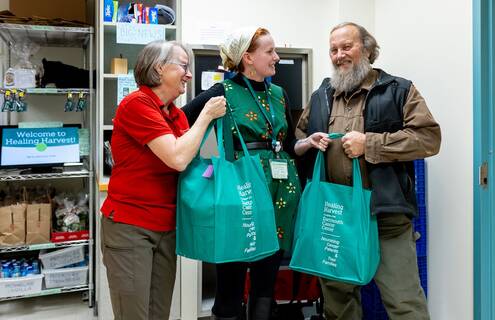
I am the person who needs the help, simply because I am here.
Phil HowardThirty-six days into treatment for prostate cancer, Phil Howard had his daily routine down to a science. First, he parked on Level 7 of the parking garage “so that I never have to worry about getting lost!” Then, he checked in to Radiation Oncology, stopping to chat with receptionist Diane Dimilia at the front desk. Before he got called in for treatment, he would duck into the temporary home of Healing Harvest, a bustling multipurpose space that served as both a copy room and food pantry. He would grab a form and place his food order for the day, which volunteers packed right away so it would be ready to go as soon as he was.
Often, by the time Phil had finished his post-treatment hot chocolate and enjoyed a chair massage courtesy of the Complementary Care Program, he had made a few new friends, too. Phil is a strong advocate not only for himself, but for other patients, often walking new patients right into the pantry to connect them with the Healing Harvest team.
Phil was so upbeat that his care team made notes in his chart commenting on his amazing positive attitude. But he wasn’t always that way. When he was first diagnosed one year ago, Phil recalls, “I kind of went into isolation, where I didn’t want to talk to anybody. When I first came here, I sat in the corner. I guess you could say I was the shy, quiet kid in the class.” But after a week of treatment, radiation oncology nurse Patsy Huysentruyt, RN, suggested to Phil that he check out the food pantry.
Like many patients, Phil was hesitant at first—a lot of patients worry that a food pantry isn’t meant for them, or that there are other people who need it more. Dartmouth Cancer Center’s food pantry began in 2022 by providing free groceries to cancer patients who were experiencing food insecurity. With philanthropic support from fundraising initiatives such as The Prouty, the food pantry, now known as “Healing Harvest,” is now open to every Dartmouth Cancer Center patient and their families, regardless of circumstances.
Having outgrown its corner of the copy room, Healing Harvest has moved into a newly constructed space. In addition to a bigger space and a new online ordering platform, the program continues to expand its staff and volunteer base to reach the rapidly growing number of patients who utilize the service. For Phil, it was a matter of realizing that “I am the person who needs the help, simply because I am here.”
“At Healing Harvest, we recognize that cancer treatment is hard enough without worrying where your next meal is going to come from, whether that’s because of the cost of food, the logistics of getting to the grocery store, or the physical and mental energy it takes to make a meal,” says Healing Harvest Program Manager Julia M. Boger-Hawkins.
Once he connected with Healing Harvest, things began to look up for Phil, who says the program made him feel that “somebody is looking out for us. All these little things do make a big difference in our lives, and the support is overwhelming.” After some time, Phil just decided to make the best of it. “Even if it’s the worst day of my life, it’s going to be the best day of my life,” he says.
Phil is constantly telling other patients about Healing Harvest, letting them know that “This might save you $75 to $100 a week in groceries. It’s so expensive to keep groceries stocked up, not to mention how many other expenses you have with missing work and paying for medications. You could go home and put together a quick salad or bake some vegetables or a homemade shepherd’s pie—you can make a nice meal without having to run to the store.”
Although the food is a big help, Phil’s favorite part of Healing Harvest are the bonds he has formed with staff and volunteers. He says, “Everybody has been very pleasant to interact with. It’s like a second home to me now.”
While the Healing Harvest team and everybody else in Radiation Oncology loved seeing Phil’s smiling face every morning, they were also thrilled when he completed his course of treatment. Phil has transitioned to follow-up appointments every 3 to 6 months. “It’s a long-term thing; it’s never going to be over,” he says. As he picks up his grocery bags to head home for the day after his first 3-month check-up, he winks mischievously and adds, “So I’ll be back to raid the pantry!”
If you are a cancer patient or care partner and would like to connect with Healing Harvest, or if you would like to make a donation to the program, please visit the Healing Harvest pages on the Dartmouth Cancer Center website or call 603-727-6489.